Two Black Boys in Paradise nominated for major award as executive producer reveals JADE, Billy Porter and Joanna Lumley are fans (EXCLUSIVE)
"Nudity was also something where we just wanted to celebrate these boys feeling free – to be themselves, to be together with no watchful eyes," says Dean Atta
By Aaron Sugg
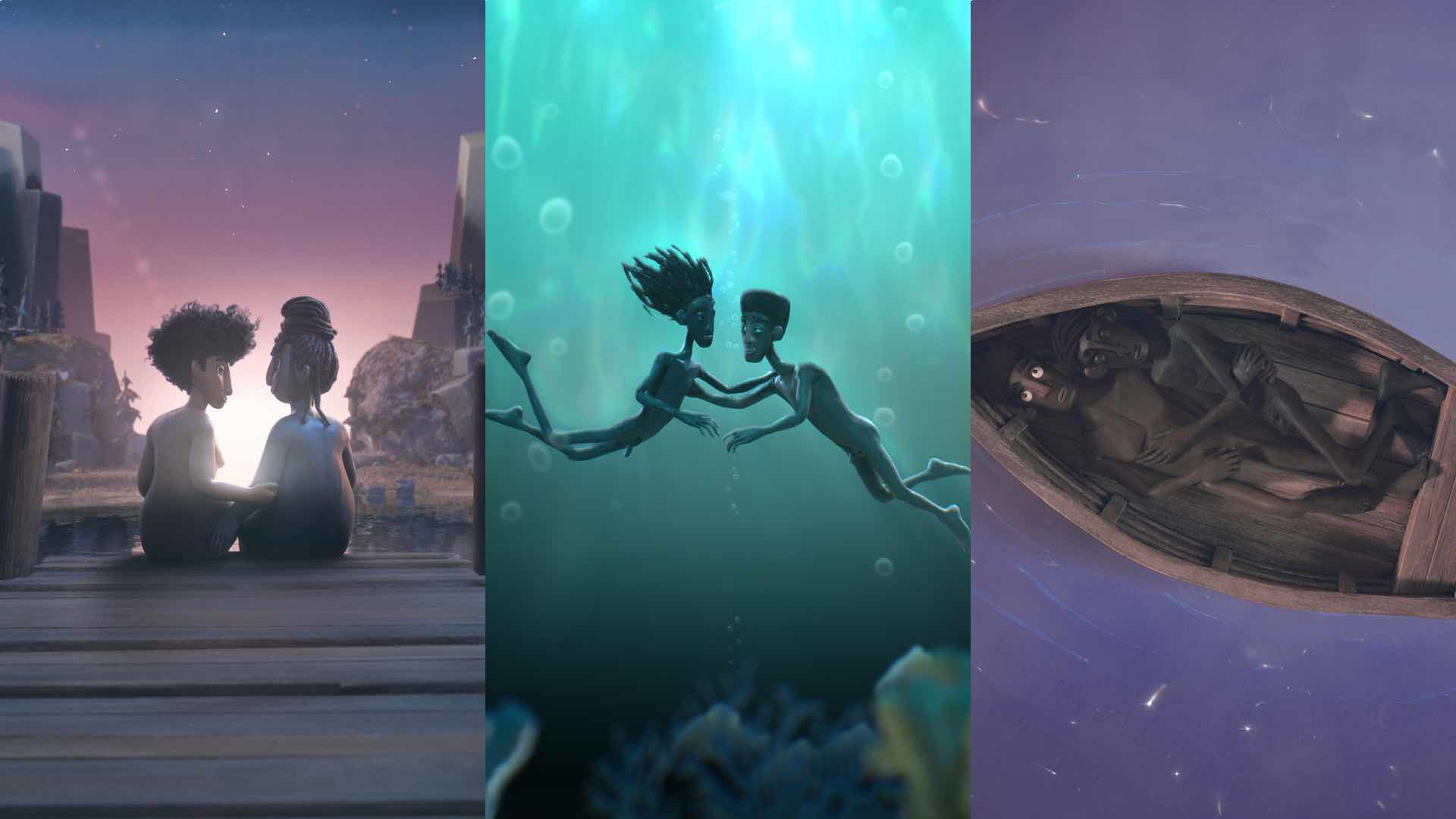
Two Black Boys in Paradise, a tender and visually pleasing animated short that lays bare the beauty and vulnerability of Black queer love, has been nominated for Best Short Film at the British Independent Film Awards (BIFA). Executive producer Dean Atta reveals that stars including Jade Thirlwall, Billy Porter, and Joanna Lumley have shown their heartfelt support for the film.
Drawn from writer Atta’s acclaimed poetry collection There Is (Still) Love Here, Two Black Boys in Paradise reimagines the story of Adam and Eve through a modern-day lens. Atta explained: “The shame only comes after they bite the apple and realise they’re naked… we just wanted to celebrate these boys feeling free, to be themselves, to kind of be together and know watchful eyes.” A work, he said, is personally healing “that inner child of mine who thought he was going to hell because he was gay.”
The delicate stop-motion animation follows Eden, 18, and Dula, 19 – two young Black men whose love and refusal to hide it transports them into a paradise free from shame and judgment. Atta said: “They are an escape from a world that seeks to oppress and discriminate against them. We created them as this couple that exists both in paradise and in what we call the real world, or the market stall, as you see it represented.”
“They are happily naked on their boat on the lake, just enjoying their paradise together” – Dean Atta on characters Eden and Dula in Two Black Boys in Paradise
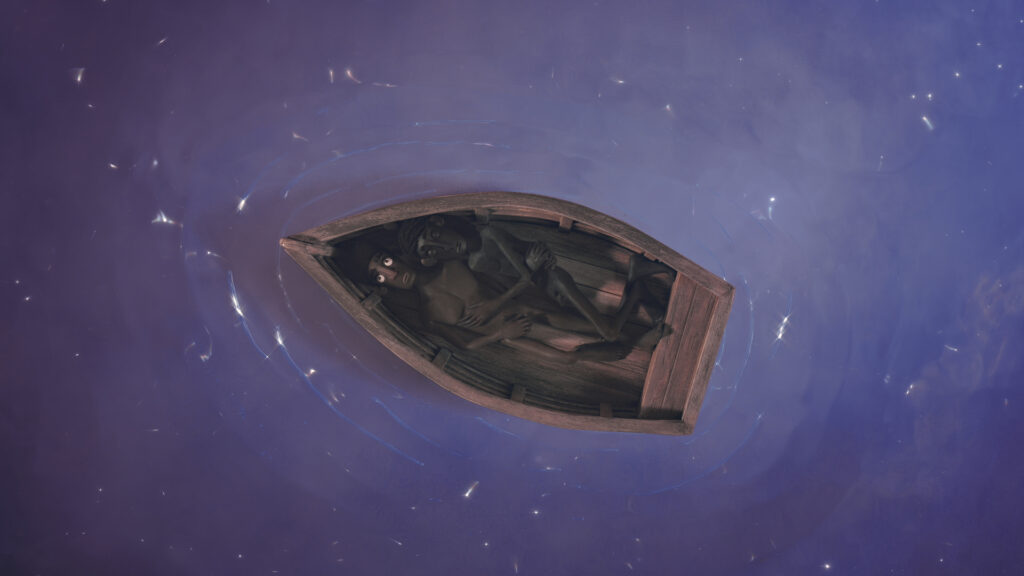
Through vivid nudity, poetry, and colourful symbolism, Two Black Boys in Paradise challenges traditional narratives of sin and purity, instead presenting love as divine and liberating. “We have an apple in this film as well. The boys reach for the apple and end up in the market stall. They’re accused of stealing the apple and the police are called,” explained Atta. He continued: “Before any of that happens, they are happily naked on their boat on the lake, just enjoying their paradise together.”
Reflecting on prejudice and discrimination against Black people, Atta used the apple symbolically in biblical text as a means for modern-day realism. Being accused of stealing an apple from a market stall, the two gay characters hold hands “because everyone’s looking at them. They’re embarrassed because the police have been called on them, even though they haven’t done anything wrong.”
Atta said this was a reflection of his own life: “These are experiences I’ve had – being stopped by the police when I hadn’t done anything, being looked at, attacked for holding a partner’s hand.” When not in reality and back in each other’s arms, safe, together, in love – the film switches back to their paradise: a rowboat on a violet-lit lake, where the pair appear fully nude. “Nudity was also something where we just wanted to celebrate these boys feeling free – to be themselves, to be together with no watchful eyes, apart from our blue peacock character that comes in.” Atta added, “That’s my favourite moment in the film… you know something good’s about to happen.”
“Queer men are put aside from men’s issues, so I wanted to bring those spaces together” – Atta on casting Jordan Stephens as the narrator of Two Black Boys in Paradise
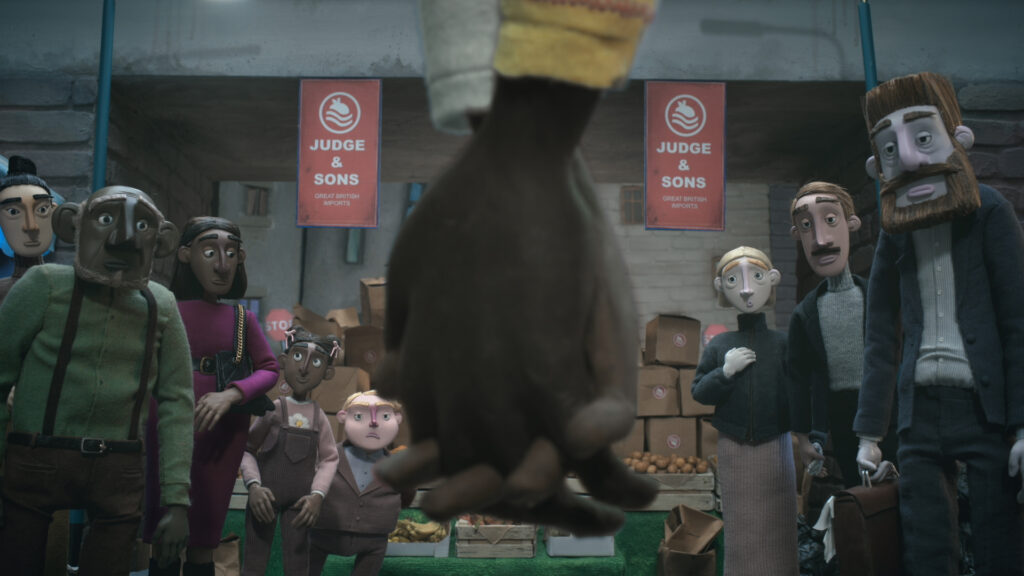
The endearing poetic film is narrated by Jordan Stephens, one half of Rizzle Kicks and Thirlwall’s boyfriend. Atta said although he could have voiced the film himself, but Stephens, a friend and collaborator, was the perfect fit as “an amazing ally, has a beautiful voice, a beautiful spirit, and a great way in the world.” On his part in Two Black Boys in Paradise, he added: “Jordan has played some great queer characters, including in Tucked — I thought he was incredible as the drag queen in that film. He’s a really outspoken queer ally, but he also speaks really well on men’s issues. I think sometimes queer men are put aside from men’s issues, so I wanted to bring those spaces together.”
The film has already had waves of support. “Jade even shared it on her Instagram, which was really lovely – that he’s gone home and shared it with his girlfriend,” said Atta about rapper Stephens. “We’ve had so many women love this film, so many non-binary people, so many white people – even though it’s about two Black boys, it has a universal message: everyone wants to find that place where they’re loved and accepted,” he highlighted, emphasising the universal love for Two Black Boys in Paradise.
“We’ve had amazing feedback from people like Billy Porter, Joanna Lumley, and Omari Douglas. We also had initial support, when we were looking for funding for this film, from Sir Ian McKellen.” Comedian Simon Amstell showed his support by hosting a Q&A at a screening for the award-nominated movie last month.
“The boat in the sex scene kind of expanded out, it’s like it’s sitting on top of a cloud” – Atta on the symbolism in the short-animated film
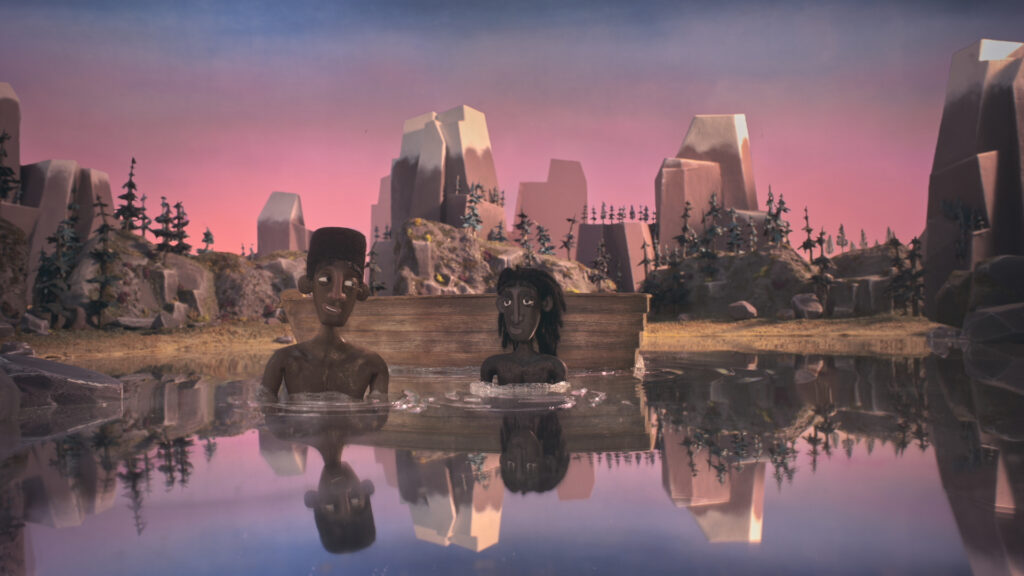
Something I found whilst watching Two Black Boys in Paradise is it really transports you into their world – from the boat, to the market, to the raft floating in the air, on cloud nine during the sex scene. It was meticulously written and crafted. “I think the boat was just a place that was incredibly close and intimate – that only the two of them could fit in… Then when you see the boat in the sex scene kind of expanded out, it’s like it’s sitting on top of a cloud – it’s just this special, sacred space that they share. For some people, that could just be a bed, but for us, we chose a boat because being on the water felt really special,” said Atta.
Atta spoke about his own relationship with water, highlighting the vulnerabilities of body image and swimming. “Personally, I didn’t feel comfortable in the water until I was with my partner,” he explained. He and his partner have been together for eight years, holidaying in the Scottish Highlands, and now, together, are keen swimmers. “For a long time in my life, I wasn’t able to comfortably float on water because I was just so tense. But with the relationship and feeling more comfortable with him and in my own body, I could float.”
Reflecting on the serenity and sanctuary of water, floating, untense, away from land, he spotlighted the realities that Black queer men, women, and people face expressing themselves in modern-day society. “I think so many of us who are Black or queer, or both, feel really tense in the world. Always looking over your shoulder, always worrying you’ll get a comment or worse.”
What is something that viewers may have missed in Two Black Boys in Paradise?
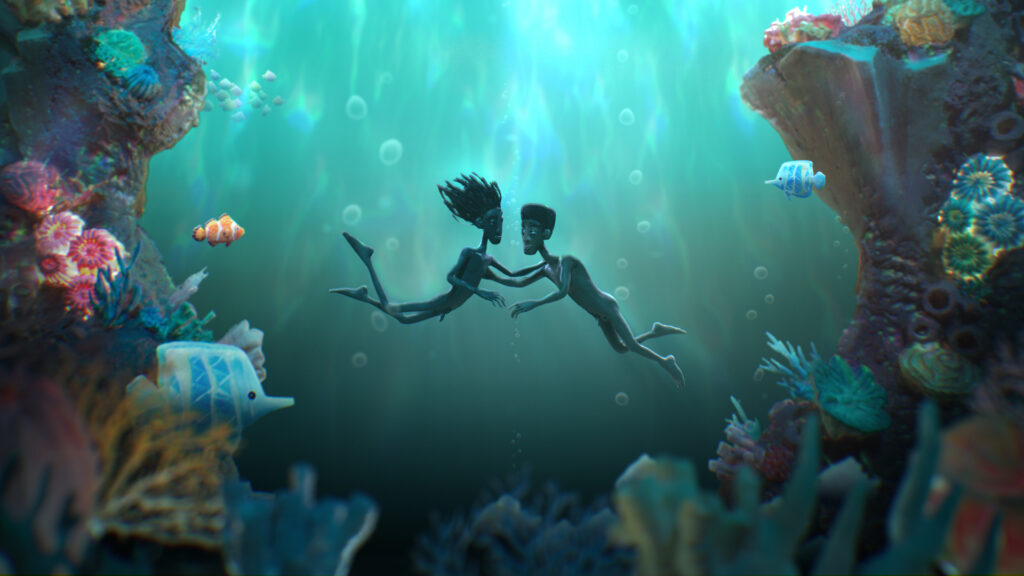
While the narrative prominently features symbolic elements such as a rowboat, an apple, and a blue peacock character, Atta has also included more subtle nods and hidden queer Easter eggs throughout the animation. “There’s a lovely bookstall in the market which features other queer authors. It has some of my own books, like The Black Flamingo, and others like Ace of Spades, Heartstopper, and Gay Club… they’re some of my strong recommendations, books that we love and think will really help other queer people,” Atta said.
Atta also highlighted a sense of community within the queer stop-motion animation space, pointing to previous work by other creators. “One of the other stop-motion animations I’ve seen a couple of times is Ovary-Acting, and many of the team behind that are queer women – they absolutely adore our film, and we adore theirs.”
Growing up, executive producer Atta found inspiration in queer love stories that explored complexity and resilience. He cited Beautiful Thing saying it was “powerful seeing boys finding love against all odds, with complex home lives.” Atta also recalls the impact of Queer as Folk, though he reflected that “I think my first gay sexual experiences – as I hinted when talking about Queer as Folk – happened too young.”
Reflecting on his own experiences, he emphasised the importance of diverse representation for LGBTQ+ people today: “I feel like queerness isn’t a fixed thing, you know, it’s quite an open thing. And so, we may identify in many different ways over our lifetimes, and that’s all fine. And I want, you, people, and all people to know that it’s okay to kind of go through a journey with your identity.”
“I’d start with Ncuti Gatwa because I love him” – Atta on a live-action casting of Two Black Boys in Paradise
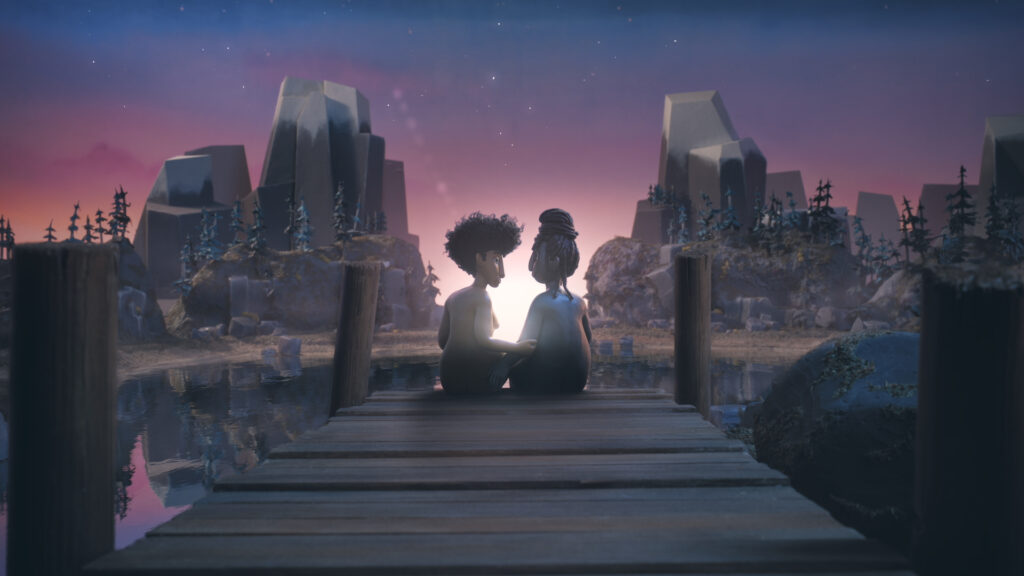
Back to the film, if there were a live-action version, Atta said: “I’d start with Ncuti Gatwa because I love him. And then, who would be the second? Oh goodness – I think once we’ve got Ncuti, we’ve got a winner. I loved him in Doctor Who, I loved him in Sex Education. I’d absolutely love to work with him – he’s my number one.” He added to the potential casting list: “I think we’d get an amazing drag queen to play the peacock… or we could ask Billy Porter – do you think he’d do it? I’d love Sir Ian McKellen to play the judge at the market stall. We could just cast it with the people who’ve already shown the film some love – I love that idea.”
Directed by Baz Sells and co-written by Sells, Atta, and Ben Jackson, Two Black Boys in Paradise has already earned international acclaim, winning awards at the London Breeze and Woodstock Film Festivals. Two Black Boys in Paradise is streaming now on Channel 4 as part of Black History Month this October in light of being shortlisted for Iris Prize Best of British
“I’m just sitting in the celebration of this film because it’s been so much hard work – four, almost five years of work for our whole team, especially Baz and Ben. It’s been such a journey, and I’m happy it’s continuing with these award recognitions. We’re now BAFTA and Oscar qualifying, so you never know what could come next.”
Watch Two Black Boys in Paradise now on Channel 4 and experience the award-nominated celebration of Black queer love.
